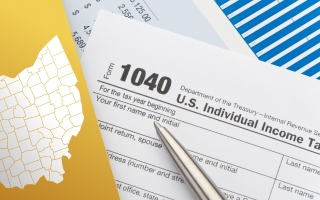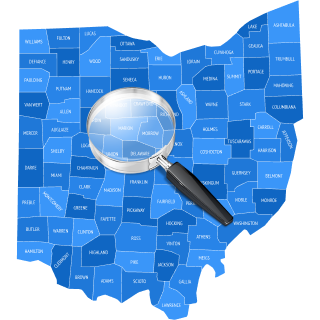Property Tax Records in Ohio

If you own a property in Ohio, you will have the obligation to pay annual property taxes. The average property tax rate in the state is around 1.41%, which is far higher than the 0.99% national average. If the property is used as a primary residence, you may be able to reduce their property taxes if they qualify for an exemption or deduction.
Keep in mind that not every property is taxed. For example, all properties owned by the state or a municipal corporation are exempt from this form of taxation, as are Academies, Schools, Churches, and Colleges.
Property taxes are determined based on factors like the local tax rate and the assessed value of your home. Each county in Ohio has an auditor who's tasked with identifying home values. Once the auditor calculates the home's market value, it's possible to determine the assessed value.
Regardless of the county you live in, you'll need to pay your property taxes in two installments. These installments are due in February and July. You should receive your tax bills in January and June.
Property taxes have been assessed in Ohio since well before it became a state. Even after Ohio gained statehood in 1803, properties were taxed based on the fertility of the land. Categories like first rate, second rate, and third rate were used to determine how much tax the owner needed to pay. In 1825, the land classification system was abolished in favor of a traditional ad valorem tax that's still in use today.
Property Tax Assessment in Ohio

Your annual property taxes are based on the assessed value of your home. Counties must perform complete appraisals at least once every six years. However, your home's value will be updated based on the market conditions during the third year following the appraisal. In Ohio, appraised values amount to 35% of the total market value. The truth of the matter is, that property tax assessment in Ohio isn't too complicated, especially when compared to other states.
Let's say that your home has an appraised value of $175,000. Based on the assessment rate of 35%, your home's assessed value will be $61,250. Keep in mind that each county can use its own appraisal method, which means that assessed values can vary considerably depending on where you live. Ohio regularly posts "sales ratios" for each county. While most counties stick to the 35% rate, others are closer to 30%.
Like most states, tax rates in Ohio are displayed as millage rates. One mill is the same as $1 in tax per $1,000 of your home's assessed value. If your county has a millage rate of 30, you'll pay around $1,837 per year if your home has an assessed value of $61,250.
Since millage rates vary from county to county, it might be easier to calculate property taxes by using the effective tax rate in your county. For example, Delaware County has an effective tax rate of 2%, which will be applied to your home's current market value of $175,000. With this tax rate, your property taxes could be as high as $3,500 per year. The tax rates in the most populous Ohio counties are:
- Franklin County: 2.06%
- Cuyahoga County: 2.51%
- Hamilton County: 1.96%
- Summit County: 1.92%
- Montgomery County: 2.29%
Cuyahoga County property taxes are much higher than those in other parts of the state, but as the second largest county by population and home to Clevland, it makes sense.
Calculate Ohio Taxes
A smart way to understand how property taxes are calculated in the state is to use an Ohio property tax calculator. This tool makes it easier for both homeowners and real estate investors to estimate their tax assessment and annual liability by entering key property details such as location, market value, and applicable exemptions.
An Ohio property tax calculator can provide a clearer picture of your expected tax bill and help identify available exemptions and tax relief programs. Common programs include the Owner-Occupied Credit and the Homestead Exemption, which provides property tax reductions for qualifying seniors and individuals with disabilities. Note that exemption amounts and eligibility requirements differ across Ohio’s 88 counties; hence, the calculator is a valuable tool for estimating personalized savings and better understanding your overall tax responsibilities.
using our property tax calculator.
Ohio Property Tax Records: What Are They?

The property taxes you pay every year are used by the county to cover the costs of many local services, such as police departments, public parks, and school systems. Keep in mind that cities, towns, and villages within each county assess their own taxes that are included as part of the overall tax rate.
When you want to research a specific home, every county in Ohio makes it easy for the public to view property tax records. These records are typically exhaustive and include everything from the square footage of the home to the property's assessed value.
The online database for property tax records can differ somewhat depending on the county. In Franklin County, you can use the auditor's website to search for property tax records with parameters like owner name, address, parcel ID, and subdivision. You can also use a map to find the specific property you're looking for. The information that you'll get from this search includes the following details:
-
Owner name
-
Property address
-
Legal description
-
Acreage
-
Previous sales history
-
Property class
-
Land use
-
Homestead credit
-
Value comparison
-
Appraised and taxable values
-
Previous tax payments
-
Land profile
-
Year built
-
Number of stories
-
Total rooms
-
Square footage
-
Building permits
-
Mapping
-
Sketches and photos
-
In-depth info on how property taxes are distributed
-
Value history
Property Tax Exemptions and Deductions in Ohio

If you're looking for options that allow you to reduce your annual tax bill, consider applying for one of the exemptions or deductions that Ohio offers. If you qualify for the homestead exemption, you'll be able to reduce your home's appraised value, which means that your annual property taxes will be lower as well. Luckily, there are plenty of Ohio property tax exemptions and deductions available.
Keep in mind that property tax laws change regularly. For example, an income limit was added to the homestead exemption in 2014. Pay attention to any changes in state law to maximize your savings.
Currently, the homestead exemption is the only option that you can use to reduce your property taxes. However, this specific exemption is limited to seniors, disabled individuals, and veterans. Here are the details on how you can qualify for an exemption.
Homestead Exemption for Seniors and Disabled Individuals: The homestead exemption is available to senior citizens who are at least 65 years old. It can also be claimed by disabled individuals. To obtain this exemption, you must own and live in an Ohio home.
The exemption will cover the first $26,200 of your home's appraised value, which means that this portion won't be taxed. Let's say that the appraised value of your home is $150,000. With this exemption, taxes will be applied to a value of $123,800. If you're disabled, you must provide proof of your disability. You can only qualify if your total income isn't higher than $38,600.
Enhanced Homestead Exemption for Disabled Veterans: The enhanced homestead exemption is designed to provide additional relief for disabled veterans. It nearly doubles the existing homestead exemption and can reduce your home's appraised value by $52,300. If your home is currently valued at $150,000, taxes will only be applied to $97,700.
How To Search Property Tax Records in Ohio

Once you have a property that you'd like to research, you can find tax records by using the county's online database or by accessing a third-party tool, such as PropertyChecker.
The main drawback to using your county's database is that it might not be easy to use. While some counties provide residents with professionally designed websites that have fast load speeds and offer intuitive navigation, others don't put much effort into their websites. However, your county assessor's website should allow you to view comprehensive property tax records.
As for PropertyChecker, their platform allows visitors to search property tax records in Ohio if they know the owner's email address, name, or phone number. They can also search by parcel ID or property address. When you search with this platform, you'll receive numerous reports that include details like:
-
Sales history
-
Property owner names and phone numbers
-
Deed records that prove property ownership
-
Loan records
-
Building permits
-
Lien records
-
Foreclosure details, such as borrower and lender names
-
Property details, which include everything from the number of bedrooms and bathrooms to the history of renovations
-
Neighborhood info
-
Assessed and market values
How To Appeal Property Taxes in Ohio

County tax assessors are tasked with appraising homes once every six years. If your home's assessed value is inaccurate, it may be years before you get relief from higher taxes. You can avoid this issue by appealing your home's value to your county government. The process to appeal property taxes in Ohio is straightforward and can be completed by adhering to the following steps.
Step 1: County assessors make valuations once every six years. These values will also be updated after three years. You can only appeal twice in six years. Once you're aware of your home's assessed value, you can appeal if you believe that the assessor's calculations are incorrect.
The first step of this process involves filing a "Complaint Against Valuation" with the local Board of Revision. You must file your complaint by March 31. If you don't meet this deadline, you'll need to wait until the following year. Your hearing will likely be scheduled for several months later. This is a somewhat formal hearing. However, it only takes 15-30 minutes. You'll receive the Board's decision in two to four weeks.
Step 2: If you're unhappy with the Board's decision, you can appeal to the Board of Tax Appeals for free. You'll need to fill out and submit DTE Form 4.
Make sure you file your appeal with the Board of Revision as well as the Board of Tax Appeals within 30 days after you receive the initial decision. You can choose to mail or email the appeal. During your hearing, the Board of Tax Appeals will review the same documentation that you gave to the Board of Revision.
Step 3: You also have the opportunity to appeal to the Court of Common Pleas, which is a different process that you can take part in after you receive the BOR's decision. However, this appeal comes with a $250 filing fee. You'll need to file a notice of your appeal with the Board of Revision and your county's fiscal officer. You must submit your appeal within 30 days after the BOR's decision.
How Property Tax Records Impact Real Estate Transactions in Ohio

Ohio property taxes are significantly higher than the national average, which is why they may negatively impact real estate transactions. If you're selling, buying, or investing in a home, property taxes can influence the outcome of this transaction. For example, let's say that you're thinking of making an offer on a $300,000 home in Clermont County. The effective tax rate in this county is 1.62%, which would result in annual property taxes of $4,860.
If you choose to fold your property taxes into your monthly mortgage payments, you'll pay an additional $405 per month, which might be more than you can afford. In this situation, you may be forced to look elsewhere for a more affordable home. Buyers often consider tax rates before purchasing homes.
Delaware has the highest property tax rate in the state, at 2.51%, which can make it more challenging to sell a home. Property taxes can also affect real estate investors. If they cause mortgage payments to increase by several hundred dollars every month, the investor may be tasked with increasing rental prices among potential tenants.
If you buy a home in Ohio, you must pay your property taxes by their due date. When you miss these payments, your taxes could become delinquent. Taxes only become delinquent if you miss the second-half tax collection period. When this happens, your taxes will be posted as delinquent in November. The county will then sell your tax certificate to an investor the following October.
Lien certificates are sold in tax lien sales, which most counties hold once every year. You can avoid the sale of this certificate on your property by paying your taxes in full. Tax liens remain active for around three years following the date of the sale. During that time, interest will continue to accumulate. Investors who purchase tax liens can foreclose on the property after the first year.
Free Ohio Property Tax Lookup
Tax Records Please wait...
Property Tax Guide
Instant Access to Ohio Property Records
- Owner(s)
- Deed Records
- Loans & Liens
- Values
- Taxes
- Building Permits
- Purchase History
- Property Details
- And More!
Free Ohio Property Tax Lookup
Tax Records Please wait...